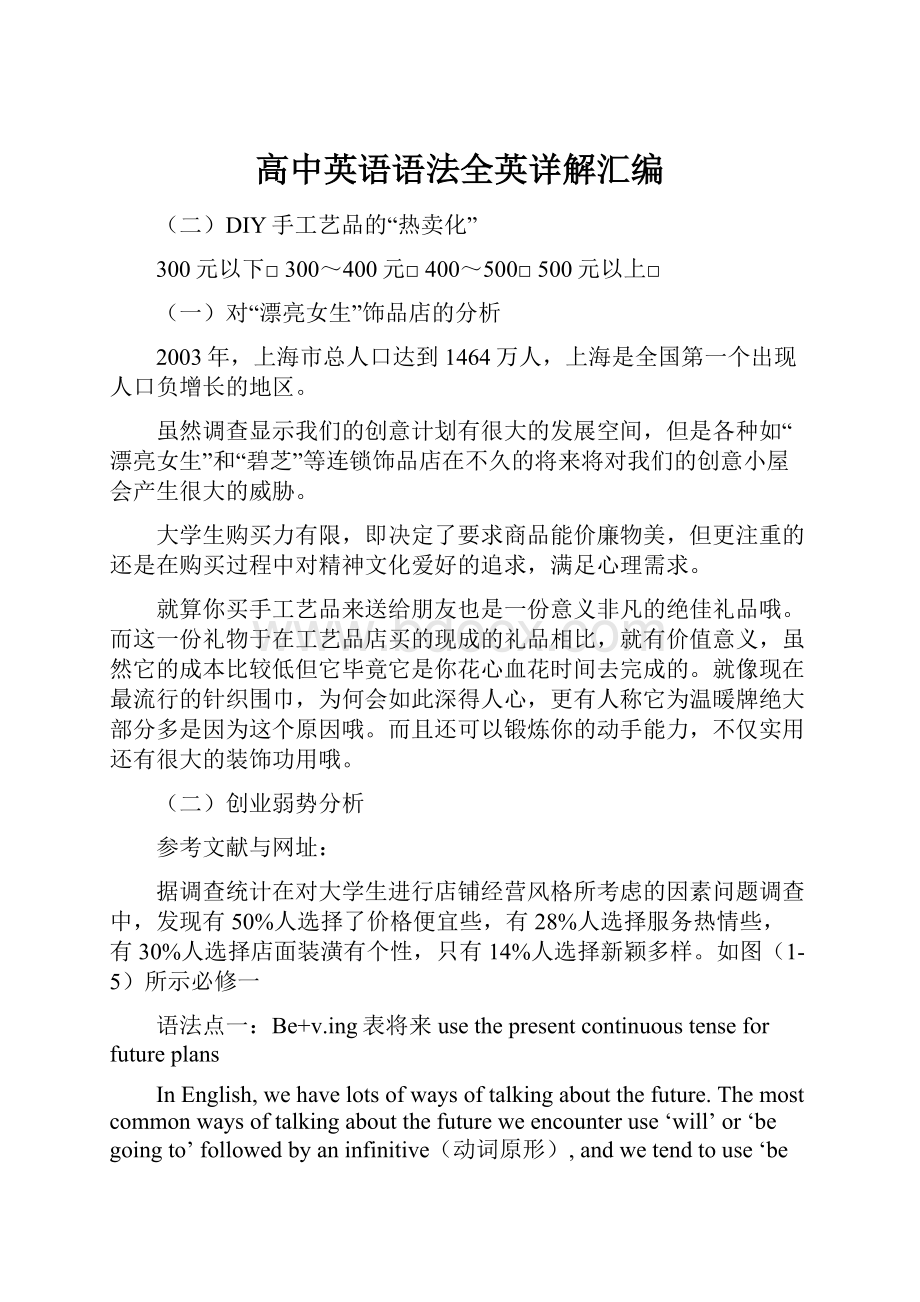高中英语语法全英详解汇编.docx
《高中英语语法全英详解汇编.docx》由会员分享,可在线阅读,更多相关《高中英语语法全英详解汇编.docx(33页珍藏版)》请在冰豆网上搜索。

高中英语语法全英详解汇编
(二)DIY手工艺品的“热卖化”
300元以下□300~400元□400~500□500元以上□
(一)对“漂亮女生”饰品店的分析
2003年,上海市总人口达到1464万人,上海是全国第一个出现人口负增长的地区。
虽然调查显示我们的创意计划有很大的发展空间,但是各种如“漂亮女生”和“碧芝”等连锁饰品店在不久的将来将对我们的创意小屋会产生很大的威胁。
大学生购买力有限,即决定了要求商品能价廉物美,但更注重的还是在购买过程中对精神文化爱好的追求,满足心理需求。
就算你买手工艺品来送给朋友也是一份意义非凡的绝佳礼品哦。
而这一份礼物于在工艺品店买的现成的礼品相比,就有价值意义,虽然它的成本比较低但它毕竟它是你花心血花时间去完成的。
就像现在最流行的针织围巾,为何会如此深得人心,更有人称它为温暖牌绝大部分多是因为这个原因哦。
而且还可以锻炼你的动手能力,不仅实用还有很大的装饰功用哦。
(二)创业弱势分析
参考文献与网址:
据调查统计在对大学生进行店铺经营风格所考虑的因素问题调查中,发现有50%人选择了价格便宜些,有28%人选择服务热情些,有30%人选择店面装潢有个性,只有14%人选择新颖多样。
如图(1-5)所示必修一
语法点一:
Be+v.ing表将来usethepresentcontinuoustenseforfutureplans
InEnglish,wehavelotsofwaysoftalkingaboutthefuture.Themostcommonwaysoftalkingaboutthefutureweencounteruse‘will’or‘begoingto’followedbyaninfinitive(动词原形),andwetendtouse‘begoingto’mostoftenfortalkingaboutfutureplans.Sometimes,wealsousethepresentcontinuoustensetotalkaboutfutureplans.
Ex.①wearegoingtoMexiconextSunday.
②Areyoucomingtothecinema?
③HeisleavingforLondonintwohours.
④WearespendingnextwinterinAustralia.
Onlysomeverbscanbeusedinthissituation,suchas:
go,arrive,come,leave,start,stay,return,play,have,work,wear,spend,see,meet,etc.
扩展:
What’sthedifferencebetweenusing‘begoingto’andthepresentcontinuoustotalkaboutfutureplans?
Let’slookatsomemoreexamples:
“I’mgoingtoplayfootballonSaturday”
Youhavemadeaplaninyourheadbutpossiblynottakenanyrealactiontoconfirmit.Also,playingfootballonSaturdayisprobablynotaregulareventforyou.
“I’mplayingfootballonSaturday”
Youhavemadeaplanandtakensomerealactiontoconfirmit(e.g.calledyourfriendsorbookedaplacetoplay).Inthiscase,it’slikelythatplayingfootballonSaturdaysisacommonactivityforyou.
语法点二:
Directspeechandindirectspeech(直接引语和间接引语)
Let'sfirstdefinetheterms,thenlookathowtotalkaboutwhatsomeonesaid,andhowtoconvertspeechfromdirecttoindirectorvice-versa.
YoucananswerthequestionWhatdidhesay?
intwoways:
byrepeatingthewordsspoken(directspeech)
byreportingthewordsspoken(indirectorreportedspeech).
Directspeechrepeats,orquotes,theexactwordsspoken.Whenweusedirectspeechinwriting,weplacethewordsspokenbetweenquotationmarks("")andthereisnochangeinthesewords.
Reportedorindirectspeechisusuallyusedtotalkaboutthepast,sowenormallychangethetenseofthewordsspoken.Weusereportingverbslike'say','tell','ask',andwemayusetheword'that'tointroducethereportedwords.Quotationmarksarenotused.
1、declarativesentence陈述句
①Changeinpronoun:
Thepronoun(subject)ofthereportedspeechischangedaccordingtothepronounofreportingverborobject(person)ofreportingverb(firstpartofsentence).Sometimesthepronounmaynotchange.
Infollowingexamplethepronounofreportedspeechis“I”whichwillbechangedinindirectspeechintothepronoun(Subject)ofreportingverbthatis“he”.
Hesaid,“Ilikeitverymuch.”→Hesaidthathelikeditverymuch.
②Changeintense:
Ifthefirstpartofsentence(reportingverbpart)belongstopasttensethetenseofreportedspeechwillchange.Ifthefirstpartofsentence(reportingverbpart)belongstopresentorfuturetense,thetenseofreportedspeechwillnotchange.
③Changeindemonstrativepronoun指示代词,temporaladverbial时间状语,adverbialofplace地点状语andverbs.
Ps:
(1)ifthedirectspeechindicatesobjectivetruth,thenthereisnochangeintensewhenit’sconvertedtoindirectspeech.
Ex.Hesaid,“Lighttravelsmuchfasterthansound.”
→Hesaidthatlighttravelsmuchfasterthansound.
(2)如果在当地转述,here不必改成there,come不必改为go,如果在当天转述,yesterday,tomorrow等时间状语也不必改变。
2、imperativesentence祈使句
Imperativesentencesdonotnormallyhaveanexpressedsubject.Inordertochangeanimperativesentenceintotheindirectspeech,weuseato-infinitive.Notethatinsteadof‘said’weuseoneofthefollowingreportingverbs:
Ask,Tell,Advise,command,request,order,forbid,decree,proposeetc.
Iftheimperativesentenceisinnegativeform,thenadd‘not’infrontofto-infinitivewhenconvertthespeech.
Ex.①Thehostesssaidtous,“Pleasesitdown.”
→Thehostessaskedustositdown.
②Hesaid,“Don’tmakesomuchnoise,boys.”
→Hetoldtheboystonottomakesomuchnoise.
3、interrogativesentence疑问句
Turnwordorderininterrogativesentenceintothatindeclarativesentence,anduseafullstopintheend.Thesubject,tense,adverbialetchavetochangeaccordingly.
(1)generalquestion一般疑问句
Generalquestionsarechangedintotheindirectspeechbyusingtheconnectiveiforwhether.Thereportingverbsayorsaidchangestoaskorasked.
Ex.Hesaid,“AreyouinterestedinEnglish?
”
→Heasked(me)ifIwasinterestedinEnglish.
(2)specialquestion
Specialquestionsarechangedintotheindirectspeechbyusingthesameinterrogative.
Ex.“Whatdoyouwant?
”heaskedme.
→HeaskedmewhatIwanted.
语法点三:
TheAttributiveClause定语从句
Attributiveclauseisasentencethatisusedtomodifyanounorapronountomakeclearwhichpersonorthingwearetalkingabout.
Ex.Themanwholivesnexttoussellsvegetable.
YoumustdoeverythingthatIdo.
Inthetwoexamplesabove,manandeverythingarecalledantecedents先行词.WholivesnexttousandthatIdoareattributiveclauses.Whoandthatarerelativepronoun关系代词.Thewordstoconnectmainclauseandattributiveclausearedividedintotwogroups,theyarerelativepronouns,namelythat,which,who,whom,whose,andrelativeadverbs,namelywhere,when,why.
Relativepronouns:
Weusewhoandwhomforpeople,andwhichforthings.Weusethatforpeopleorthings.
1.That,which,who
2.Whose
Whosereplacesagenitivenoun名词所有格inanattributiveclause.Theantecedentcanbethingorperson.
Ex.Thisisthescientistwhosenameisknownallovertheworld.
Theroomwhosewindowfacessouthismine.
3.When,where,why
First,whentheantecedentisaboutreason,anditactsasanadvintheattributiveclause,wewilluse“why”.Second,whentheantecedentisabouttime,anditplaystheroleofanadv,“when”willbeused.Third,whentheantecedentisaboutplace,playingtheroleofanadvofplace,wewillconsideradoptingwhere.
必修二
语法点一:
(接定从讲)
4.Therestrictiveandnon-restrictiveattributiveclause.限制性和非限制性
(1)Restrictiveclauseslimitthepossiblemeaningofaprecedingsubject.Theyareusuallynotmarkedbypausesinspeech,andtheyarenotsetoffbycommasinwriting.Sometimestherelativepronounwhichservesasanobjectinclausecanbeomitted.
Ex.Whatisthenameofthetallmanwhojustcamein?
Beijingisacity(that)I’vealwayswantedtovisit.
Hehasfoundthebook(that)hewaslookingfor.
(2)Nonrestrictiveclausestellyousomethingaboutaprecedingsubject,buttheydonotlimit,orrestrict,themeaningofthatsubject.Theyareusuallymarkedbybriefpausesinspeechandareusuallysetoffbycommasinwriting.Relativecannotbeomitted.
Ex.Beijing,whichisthecapitalofChina,hasaverylonghistory.
YesterdayImetLiPing,whoseemedtobeverybusy.
Ps:
①Inrestrictiveattributiveclause,relativeadverbsbehindtimeorplacesometimescanbeomittedinspokenEnglish.
Ex.Thatwastheyear(when)Ifirstwentabroad.
Weneedaplace(where)wecanstayforafewdays.
②Whyclausecanonlymodified‘reason’anditcanbeconvertedto‘forwhich’.InspokenEnglish,wecanalsouse‘that’orjustomittherelative.
Ex.Thereason(why/forwhich/that)IboughttherosesisthatMarylikesthem.
③‘How’cannotbeusedasrelativeadverbs.Weuseinwhich,that,ornorelativetomodify‘way’.
Ex.Thisistheway(how)Ididit.(wrong)
Thisistheway(inwhich/that)Ididit.(correct)
④theattributiveclausecanalsobecalledasrelativeclause.
语法点二:
Thepassivevoice
Wehavelearnedthepassivevoiceofthesimplepresenttenseandsimplepasttense.
1.Thesimplefuturetense(useaskasanexample)
Ps:
affirmativeform;negativeform;interrogativeform
2.Thepresentperfecttense
3.Thepresentcontinuoustense
4.Phrasalverb短语动词
Normally,onlytransitiveverbscanbeusedinpassivevoice,butwiththeadditionofprepositionoradverbtointransitiveverbs,somephrasalverbsserveastransitiveverbs,sotheyhavepassivevoicetoo.Payattention,wecan’tmissanypartofphrasalverbwhenwechangeitintopassivevoice.
Atlasttheyputoutthefire.→Atlastthefirewasputout.
Theywillputupanoticeonthewall.→Anoticewillbeputuponthewall.
Haveyousentforadoctor?
→Hasthedoctorbeensentfor?
Ps:
必修三
语法点一:
modalverbs情态动词
Amodalverbisatypeofverbthatisusedtoindicatemodality–thatis:
likelihood,ability,permission,andobligation.Theyhavetobeusedwithinfinitive.
Can-couldmay-mightshall-shouldwill-wouldhaveto-hadtomust
1.Can&could
Theycanbeusedtoindicateability,permission,possibility,etc.
Ps:
Possibility:
Weusethemodalcantomakegeneralstatementsaboutwhatispossible:
Itcanbeverycoldinwinter.(=Itissometimesverycoldinwinter)
Weusecouldasthepasttenseofcan:
Itcouldbeverycoldinwinter.(=Sometimesitwasverycoldinwinter.)
Weusecouldtoshowthatsomethingispossibleinthefuture,butnotcertain:
Ifwedon’thurrywecouldbelate.(=Perhaps/Maybewewillbelate)
Weusecouldhavetoshowthatsomethingis/waspossiblenoworatsometimeinthepast:
It’steno’clock.Theycouldhavearrivednow.
Permission:
Weuse can toaskforpermissiontodosomethingorgivepermission;couldismoreformalandpolitethancan.
2.May&might
Ps:
Thenegativeformsaremaynotandmightnot.
Weusemay